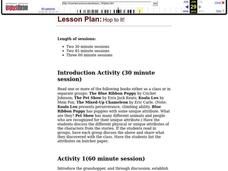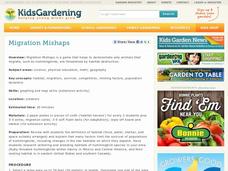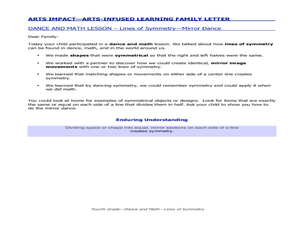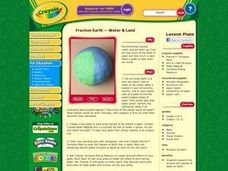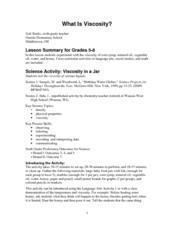Curated OER
Batting Practice: Using Math to Calculate Baseball Statistics
Students calculate and record batting average, hits, and at bats. In this Batting Practice: Using Math to Calculate Baseball Statistics lesson, students utilize mathematical formulas to determine the career statistics of baseball player...
Curated OER
Introducing the Concept: Percents
Students explore the math concept of percents. In this percents lesson, students examine visual examples of the relationships among fractions, decimals, and percents. Students also practice solving problems that their instructors model.
Curated OER
Math Challenge
Students, using laminated math flash cards, play a review game with a partner. Also using Polyspots, they run, walk, or skip to the board with their answers.
Curated OER
Count on Math
Students develop number sense up to a million. In this developing number sense up to a million lesson, students count their breaths in given time span. Students use blocks representing 10's and 100's to create a...
Curated OER
Fraction and Decimal Ordering
Ordering numbers just got physical! Learners practice putting numbers in sequence, both in fraction and decimal form. To begin, they line up in birthday order and discuss the difference between ascending and descending. They are then...
Curated OER
Initial Fraction Ideas Lesson 12: Overview
Students name and draw fractions by using their fractions circles. For this rational numbers and fraction lesson plan, students name mixed numbers and improper fractions using their fraction circles.
Curated OER
Hop To It!
Young scholars explore grasshoppers. In this grasshoppers lesson, students measure the jumping distance of live grasshoppers. Young scholars then record the jumping distance of people in their group. Students record the...
Curated OER
What is Matter?
Students investigate what matter is and how it changes states. In this physical properties lesson, students examine the vocabulary database and identify the characteristics of the three phases of matter. Students perform a...
Curated OER
How Does Your Garden Grow?
Students construct and maintain a school garden. In this gardening lesson, students plan the construction of the garden by writing letters to local businesses asking for supplies and materials; students build the garden using their math...
Curated OER
Counting to 10
Students count and recognize numbers to 10. In this math lesson students play a CD-ROM game Mouse in the House: Blast Off. Support worksheets are also included.
Curated OER
Invent a .....
Students explore inventions. In this physical science invention instructional activity, students work with a team to create an invention using everyday materials.
National Gardening Association
Migration Mishaps
Elementary ecologists pretend to be migratory hummingbirds. They fly between wintering and nesting grounds, trying to reach a habitat haven. In a musical-chair fashion, some birds will miss out, and are removed from the game. To further...
K12 Reader
Eratosthenes: Geographer and Mathematician
Mathematicians can be famous, too! Introduce your class to Eratosthenes with a reading passage. After they complete the passage, learners respond to five questions, some of which require opinions and others reading comprehension skills.
Curated OER
Lines of Symmetry - Mirror Dance
Fifth graders analyze how to divide space or shape into mirror sections to create lines of symmetry. In this lines of symmetry lesson, 5th graders discuss symmetry in dance, math, and living. Students participate in a dance warm-up and...
Curated OER
Fraction Earth -- Water and Land
Students research the amount and sources of water on Earth. They interpret data to create a physical representation of water and land mass on the planet. They then use art materials to create a visual and tactile representation of...
Curated OER
Physical Science: The Three Billy Goats Gruff
Explore science through problem solving and learning how to solve the problem of the story "The Three Billy Goats Gruff." Young investigators will learn how to construct a model and design a solution. They will also keep records of their...
Curated OER
What Is Viscosity?
Students experiment with the visocosity of corn syrup, mineral oil, vegetable oil, water, and honey. They research viscosity before beginning. Pupils draw the conclusion that the marble sinks more slowly in the liquids with greater...
BioEd Online
Good Stress for Your Body
Stress the importance of the different types of pressure our mind and body experience in a lesson about how certain types of stress are actually necessary and good for our bodies. As astronauts and people with injuries can attest, not...
Teach Engineering
Properties of Mixtures vs. Solutions: Mix It Up!
Now it becomes crystal clear why the unit is called Mixtures and Solutions. The fifth installment of a six-part unit explores mixtures and solutions. After viewing a demonstration on mixing pebbles with water, salt with water, and...
Teach Engineering
Alloy Advantage
Mix it up by using an intriguing resource that teaches young metallurgists that alloys are a metal mixture. They learn about the advantages of using alloys over pure metals and investigate titanium alloys as an example to finish the...
Wild BC
Bearly Any Ice
After reviewing food chains, your class members participate in an arctic predator-prey game that exemplifies the impact of climate change of food availability. If you are in a hurry, skip this lesson, but if you have the time to...
Oklahoma State University
Hairy Heredity
Young scholars learn that heredity comes down to the flip of a coin with this cross-curricular math and science lesson. Using smiley faces as a model, learners toss coins to determine which dominant or recessive traits...
Baylor College
Your Energy Needs (BMR)
How many Calories one needs on a daily basis is dependent on a number of factors including gender, height, and activity level. In the third of seven lessons about energy and food, young nutritionists calculate the number of Calories...
BioEd Online
Bone Structure: Hollow vs. Solid
What is meant by the phrase "form follows function?" Allow your budding biologists to discover first-hand through two activities. In the first, groups work together to discover whether a solid cylinder or an empty cylinder can support...






